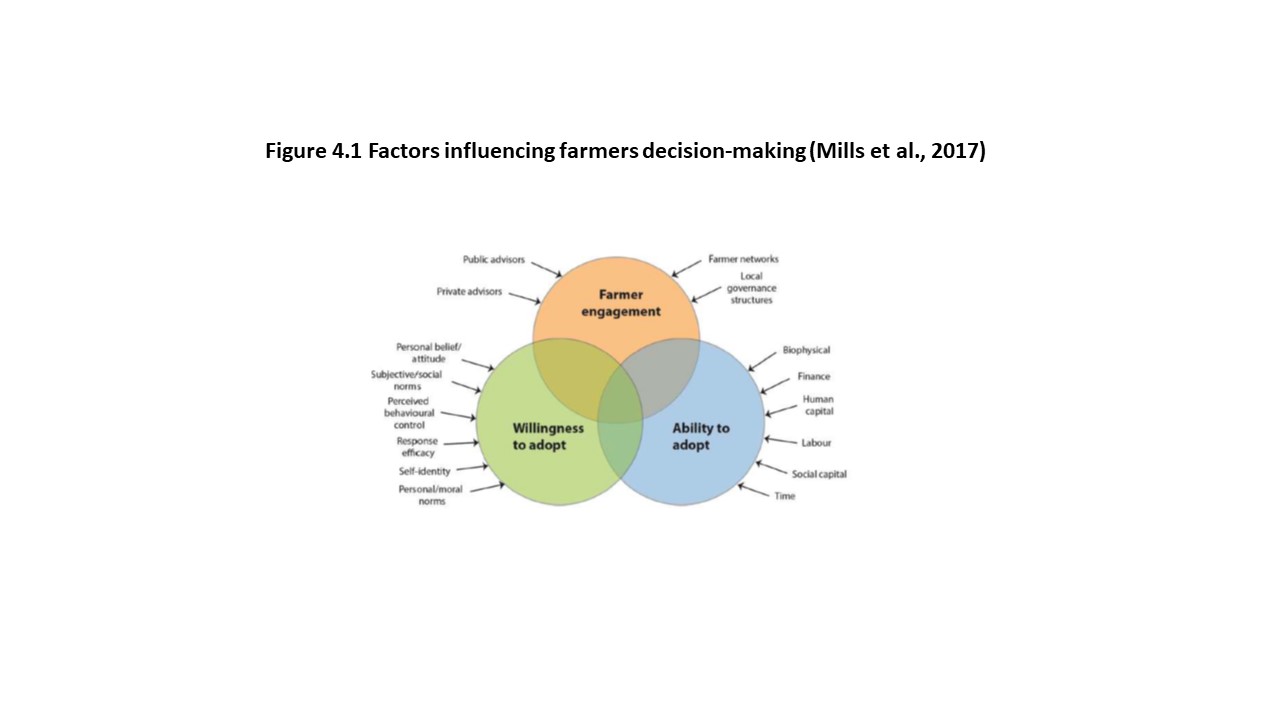Post a comment on the text below
4.2.3 Influencing uptake of more sustainable water management and farm practices
The uptake of more sustainable water management and farm practices run against established production models. Radically altering agricultural systems is likely to disrupt established investments, jobs, consumption patterns and behaviours, knowledge and values, inevitably provoking resistance from affected industries, regions or consumers (EEA, 2019g). There are thus strong economic, social and psychological barriers that can lock the agricultural sector existing production modes. Transforming farm practices and moving towards sustainability can be very costly at farm level. It was estimated that meeting WFD requirements relating to abstraction pressures in some agricultural dominated basins of Southern France could reduce up to 50% of gross margin of certain farms (Danel, 2011).
To achieve a transition, a deep understanding of farmers’ decision-making is needed. Farmers’ decisions are shaped by a complex array of biophysical, economic, technical, social, political and institutional factors (Dwyer et al., 2007; Blackstock et al., 2010; Mills et al., 2017). Figure 4.1 provides a schematic overview of factors influencing farmers’ decision-making commonly reported in the research literature. These system elements, and their evolution, creates both opportunities and barriers to change practices towards more sustainable solutions.

Public policies have a key role to exploit these factors and create the right institutional, political, technological, economic and social environment to facilitate the transition towards more sustainable agricultural production models. Decision-makers have a wide range of instruments at their hand to encourage uptake of more sustainable solutions. Given the wide range of factors influencing farmers’ decision-making, policy mixes combining different forms of interventions and policy interventions are more likely to be effective (Garforth and Rehman, 2006):
- Adoption can be triggered by raising awareness, building social capital and facilitating collective action (Blackstock et al., 2010). Effective uptake is not solely driven by scientific advice, but by more inclusive processes leading to the co-creation of knowledge with farmers that improve the applicability and relevance of scientific knowledge to the particular local conditions of the farms. In that sense, creating networks between farmers to share experience and spread innovations are essential tools, which are at the core of agroecological practices (FAO, 2018a; EIP-AGRI, 2020).
- When lack of financial resources, time or labour block adoption of measures, other instruments may be more effective, for example economic instruments, such as prices, taxes and market mechanisms, and regulatory instruments, such as limits and bans to the use of harmful inputs to the water environment, and broader sustainability standards.
Past policy emphasis has been on improving efficient use of resources, although more sustainable farm practices and production models have also been pro-actively adopted by the farming community, and are increasingly supported by the European policy framework. However, to move further towards sustainability, uptake needs to be wider and more profound. Two approaches to scale up can be contrasted:
- An incremental approach would support improved resource efficiency to increase the environmental performance of farms, and broaden approaches adopted in a limited range of farms and production systems to a wider set of farms and environments.
- A more transformative approach would encourage a wider and more systemic change, not only in agricultural production but also in the drivers of agricultural production, i.e. in the societal systems consuming agricultural commodities in the form of food, energy and other bio-products such as fiber for clothing and industrial processes.
The next sections in this Chapter 4 explores how the current EU policy framework has so supported an incremental approach, and how this approach can be strengthened with recent initiatives. A more transformative approach is explored in more depth in Chapter 5 when drivers in consumption systems are presented in more depth.
You cannot post comments to this consultation because you are not authenticated. Please log in.


